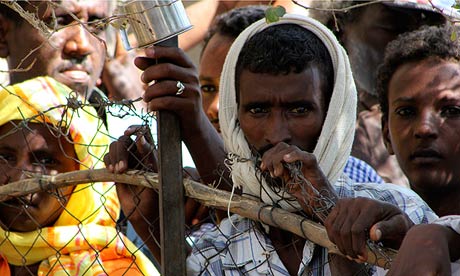(10 September 2017) The African Centre for Justice and Peace Studies (ACJPS) is deeply concerned for the safety of 30 children between 15 and 17 years of age who were forcibly returned to Eritrea by the Sudanese authorities on 29 August. The children were part of a group of 66 Eritrean asylum seekers detained by Sudan’s armed forces in July and found guilty of illegal entry into Sudan. 36 adult members of the group, who were sentenced to two months in prison prior to deportation, face an imminent risk of deportation.
The forced return of asylum seekers without allowing them to first apply for international protection and properly reviewing their cases is a serious violation of international law. Sudan has an international legal responsibility to ensure no person is forcibly returned to a country where they are at risk of persecution or other serious human rights violations, regardless of how they arrive in a country and whether they have identity documents.
ACJPS calls on the Government of Sudan to comply with its obligations under the 1951 UN Refugee Convention and its own 2014 Regulation of Asylum Act, and allow all individuals seeking international protection unrestricted access to the UNHCR and to asylum procedures in order to have their claims reviewed by the competent authorities.
The group of 66 Eritrean asylum seekers were arrested on 11 July 2017 by the Sudanese Armed Forces in Wad Alhileo, a Sudanese town on the border with Eritrea. The group was handed over to the police in Kassala and charged with illegal entry under Article 30 of the Immigration and Passport Act of 1994. They were transferred to Kassala prison on 16 August 2017.
Article 30 (1) of Sudan’s Immigration and Passport Act of 1994 provides that, “whoever enters or resides in Sudan illegally shall be imprisoned for no less than one year and not exceeding two years, fined or both together. The punishment also includes a deportation order from the court.”
The group first appeared before Kassala criminal court on 18 August 2017. However, the presiding judge refused to hear the case, acknowledging that they intended to make a claim for refugee status, and made an order for them to be transferred to a refugee reception centre.
According to a reliable source, the court proceeded with the prosecution following political pressure. On 28 August 2017 the group of 66 reappeared before Kassala criminal court and were found guilty of illegal entry. 30 minors, aged between 15 and 17, were deported the following day. 36 adults were sentenced to two months’ imprisonment followed by deportation. They are currently held at Kassala prison and may be deported any day.
Sudan’s own Regulation of Asylum Act, adopted in 2014, provides that asylum seekers should not be penalised for illegal entry or presence provided that they present themselves to the nearest office of the national Refugee Commission or other national authority within one month. Under article 7(1) of that law, Sudanese officials coming into contact with anyone seeking international protection shall refer them immediately to the nearest office of the Refugee Commission for the consideration of their claim.
The Eritrean government imposes tight restrictions on the right of its nationals to leave Eritrea and severe punishment on returnees, in particular to ensure that individuals fulfil their national service obligations. According to the report of a UN Commission of Inquiry on human rights in Eritrea issued in 2015, with a few exceptions, those who have been forced to return to the country have been arrested, detained and subjected to ill-treatment and torture. The Commission also found that the system of compulsory and indefinite national service implemented by the Eritrean authorities “involves the systematic violation of an array of human rights on a scope and scale seldom witnessed elsewhere in the world”. Conscripts are systematically subjected to intentional punishment and ill-treatment aimed at inflicting severe pain and thousands of children are forcibly conscripted each year.
The Sudanese police filed a separate criminal case against five other Eritrean nationals who were arrested together with the group of 66 asylum seekers on 11 July 2017 and are accused of smuggling people across the Sudan border.
Background
Sudan is a state party to the 1951 UN Convention relating to the status of Refugees and the 1967 Protocol, as well as the 1969 Convention Governing the Specific Aspects of Refugee Problems in Africa. These international legal instruments require the government of Sudan to ensure that it does not remove any person from its territory to a country where they face a real risk of persecution.
Sudan adopted a new Asylum Regulation Act in 2014, which bans the removal from Sudan of any person with a genuine fear of persecution in their country of origin. This Act replaced the Regulation of Asylum Act of 1974. This principle, known as the prohibition on non-refoulement, covers all forms of forced return, including legal or other measures such as extradition, deportation, returns at the border and collective expulsion.
In June 2015, ACJPS documented 32 Eritrean asylum seekers at risk of forced return to Eritrea after a Sudanese court ruled that the group be deported from Sudan after serving two months in prison. The group was found guilty of illegal entry by a court in Sudan’s Red Sea State that borders Eritrea.
Contact: Mossaad Mohamed Ali, ACJPS Executive Director: +256 779584542 / Katherine Perks, ACJPS Programme Director: +1 519 551 8084 or info@acjps.org.
 African Centre for Justice and Peace Studies ACJPS | المركز الافريقي لدراسات العدالة و السلام
African Centre for Justice and Peace Studies ACJPS | المركز الافريقي لدراسات العدالة و السلام




